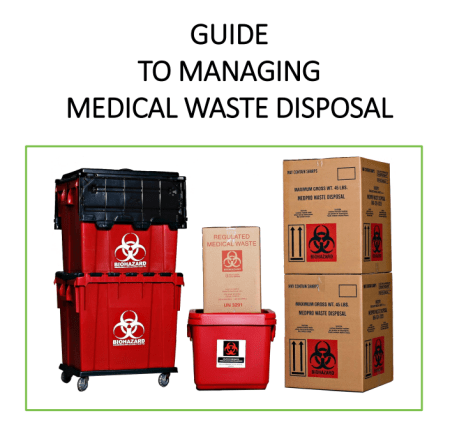Liable Solutions: Recognizing Medical Waste Disposal Provider
In the world of healthcare, the correct disposal of medical waste is a critical facet that demands mindful consideration. The importance of taking care of medical waste properly exceeds simple conformity with guidelines; it straight impacts public health and wellness and environmental security. As healthcare centers generate different kinds of waste that require specific handling, understanding the nuances of clinical waste disposal services is paramount. By checking out the details of this necessary procedure, we can shed light on the finest methods, benefits of professional services, and sustainable solutions available.
Importance of Proper Medical Garbage Disposal
Correct clinical waste disposal is important in maintaining a safe and hygienic environment within healthcare centers. In health care settings, various sorts of waste are created daily, including infectious materials, sharps, ran out drugs, and chemical compounds. If not correctly taken care of, these wastes can posture major dangers to both healthcare employees and the general public. Improper disposal can bring about the spread of infections, injuries from sharps, contamination of water resources, and harm to the setting.

Kinds Of Medical Waste
Within medical care facilities, a varied array of waste products identified as clinical waste is produced, each calling for specific handling and disposal methods. Pathological waste, which consists of tissues, body organs, and body parts, necessitates correct disposal to appreciate the self-respect of the departed and prevent any kind of biohazards. Comprehending the various types of medical waste is essential for medical care centers to apply efficient waste monitoring methods and safeguard public health and the setting.
Regulations and Conformity
Healthcare centers need to abide by rigid guidelines concerning the handling and disposal of clinical waste to ensure conformity with legal demands and safeguard public health and wellness. These guidelines are implemented to avoid the spread of infections, shield the setting, and preserve the safety and security of health care workers and the general public. Various regulative bodies, such as the Epa (EPA), the Occupational Security and Health And Wellness Management (OSHA), and the Department of Transportation (DOT), have certain standards that healthcare facilities have to follow.
To follow these laws, healthcare centers have to correctly set apart, store, transport, and dispose of various kinds of medical waste. This consists of sharps waste, transmittable waste, contaminated materials, and pharmaceutical waste, each needing specific dealing with treatments. Facilities should likewise preserve precise records of waste generation and disposal to show compliance throughout evaluations.
Non-compliance with medical waste laws can result in severe fines, fines, and damage to the facility's online see here reputation. It is vital for health care facilities to stay notified about the latest regulations and carry out durable compliance measures to protect public wellness and the atmosphere.
Benefits of Specialist Disposal Solutions
Engaging specialist medical waste disposal solutions offers healthcare centers a reliable and reputable solution for handling harmful materials. These solutions use trained experts who are fluent in taking care of different kinds of clinical waste, guaranteeing appropriate partition, transportation, disposal, and packaging. Medical Waste Disposal Services.
Furthermore, expert disposal solutions make use of state-of-the-art equipment and adhere to sector best practices to reduce ecological influence and reduce the risk of contamination. This not just promotes a more secure workplace for medical care staff but likewise contributes to total public health and security. Furthermore, outsourcing medical waste disposal can bring about set you back financial savings over time by removing the need for in-house monitoring and disposal systems.
Sustainable Practices in Healthcare

One key lasting technique in health care is waste reduction. By a knockout post carrying out strategies to minimize unneeded product packaging, single-use items, and general waste generation, healthcare facilities can considerably lower the amount of waste sent to landfills or incineration. Furthermore, reusing programs for products like glass, plastic, and paper can better minimize the ecological influence of healthcare operations.
Conclusion
To conclude, correct clinical garbage disposal is important in preserving a healthy and balanced and secure setting for both health care workers and the basic public. Comprehending the different kinds of clinical waste, complying with regulations and compliance standards, and making use of specialist disposal services are important actions in responsible waste monitoring. By adopting sustainable practices in medical care facilities, we can lower environmental impact and ensure the health of all individuals associated with the health care market.
As healthcare centers generate different types of waste that require specific handling, understanding the subtleties of clinical waste disposal services is extremely important.Within health care centers, a varied selection of waste materials identified as clinical waste is generated, each calling for particular handling and disposal approaches. Understanding the numerous kinds of clinical waste is vital for sites healthcare facilities to implement reliable waste administration strategies and safeguard public wellness and the environment.
By carrying out approaches to reduce unneeded packaging, single-use products, and total waste generation, healthcare facilities can considerably reduce the quantity of waste sent out to land fills or incineration. Recognizing the various types of medical waste, complying with guidelines and conformity standards, and using expert disposal solutions are crucial steps in liable waste management.